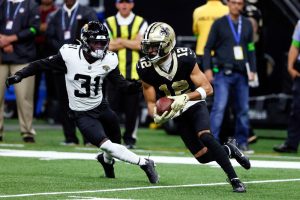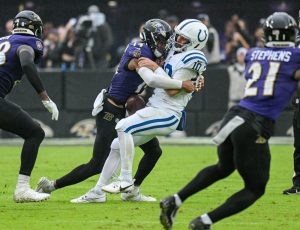
Column: Montez Sweat trade comes down to 1 goal — Ryan Poles and the Chicago Bears are seeking to add ‘erasers’
It’s going to be a lot to ask Montez Sweat to make the impact Khalil Mack had with the Chicago Bears in his first game and before him Julius Peppers.
But Ryan Poles was dreaming big when he became the only general manager for a team with a losing record — the Bears enter Sunday’s game against the New Orleans Saints at the Caesars Superdome at 2-6 — to be a buyer at the trade deadline day Tuesday.
Poles is banking on Sweat being a difference maker for seasons to come and used the term “eraser” when talking about the need to add elite players to the roster Wednesday after Sweat passed his physical and the trade of a 2024 second-round draft pick to the Washington Commanders was finalized.
What does an eraser look like? They come in all shapes and sizes and play nearly every position. You see them routinely when you watch weekend highlights. They come in the form of edge rushers who defeat offensive tackles with aggressive hand moves before bending the corner to the quarterback. They come in the form of penetrating defensive tackles who with a lightning-quick first step and swim move are in the backfield before the quarterback can blink. They come in the form of cornerbacks who undercut a route on third down just to get their hand up in time to bat away a pass. They come in the form of wide receivers or tight ends who routinely find ways to make contested catches when everyone in the stadium knows the ball is headed their way.
They are what the Bears need to continue to add to their roster as they work toward become more competitive and be in position to close out games in the fourth quarter.
“We have to continue to add good players to help us get over the hump,” Poles said. “We’ve got to add playmakers. Like when you have some of these mistakes that we’ve had, when you watch NFL football in general, you have guys that can just … I call them erasers. Erase some of those mistakes, those turnovers, make plays.
“We’ve just got to get to a place that we can do that, and also close the gap where we can play clean football. When we’ve played clean football this year, we’ve won games. When it gets sloppy, we haven’t.”
If Sweat can serve as an eraser, he will on occasion be able to make his biggest plays when the defense needs it — after a turnover, in the red zone, on third down — a momentum-shifting effort that gets the defense off the field.
DJ Moore made that kind of play in the Washington game in Week 5 when the Bears were facing third-and-2 at their 44-yard line and leading 30-20 with a little more than four minutes to play. He soared along the sideline to snare a high pass from Justin Fields over cornerback Kendall Fuller, turning and racing 56 yards for a score that put the game away.
Mack, in his Bears debut with the Bears in 2018, was a one-man wrecking crew in Green Bay with an interception return for a touchdown and a sack, forced fumble and recovery when the Packers were at the Bears 9-yard line. A Mitch Trubisky fumble with 58 seconds remaining derailed the Bears in a 24-23 loss at Lambeau Field.
Peppers’ strip-sack of Matthew Stafford with 20 seconds remaining in the first half of the 2010 opener at Soldier Field set up a Robbie Gould field goal that proved to be the go-ahead score in a 19-14 victory against the Detroit Lions.
The Los Angeles Chargers on Sunday snuffed out the Bears’ momentum from the first play of the game — a 41-yard completion from Tyson Bagent to Darnell Mooney — almost immediately. Mack corralled Trent Taylor for a 2-yard loss on a jet sweep, and Joey Bosa sacked Bagent for a 10-yard loss on the next snap, knocking the Bears out of field-goal range.
“Those guys that affect the game in a way that there’s a big play and then there is someone that steps up and creates a negative play and eliminates that momentum you just created,” offensive coordinator Luke Getsy said. “When you have guys that can either turn the ball over or create those sacks or negative runs, those are erasers.”
Erasers also can be called “multipliers” because they have a way of making the players around them better. A wide receiver who is a multiplier attracts more coverage from the secondary and, in turn, creates more advantageous matchups for other players. A multiplier on the defensive line who is attracting chips or slide protection sets up teammates with one-on-one opportunities.
It’s yet to be seen how Sweat will affect the players around him, but the Bears have to be hoping in the short term his presence unlocks Yannick Ngakoue, who has gone three games without a quarterback hit. Sweat had success in Washington running twists and games with tackles Jonathan Allen and Daron Payne. With time on task, he should be able to develop chemistry with Justin Jones and DeMarcus Walker and rookies Gervon Dexter and Zacch Pickens.
The ultimate multiplier or eraser comes at the quarterback position, a guy who can make a big play when needed time and again, get the offense out of a bad call at the perfect moment and account for a free rusher and turn it into an explosive play.
The Bears aren’t there with the quarterback at this point. Maybe that will come in the offseason. They’re in need of erasers across the board and are hoping to pay Sweat like he will be one.
Scouting report
Chris Olave, Saints wide receiver
Information for this report was obtained from NFL scouts.
Chris Olave, 6-foot, 187 pounds, is in his second season after the Saints selected him with the No. 11 pick out of Ohio State in 2022. Olave leads the Saints with 44 receptions for 517 yards and has one touchdown.
Some have considered his second season a bit of a disappointment after a breakout rookie year in which he caught 72 passes for 1,042 yards and four touchdowns. He’s averaging 6.7 yards per target after being at 8.8 last season, and the Saints’ primary deep threat has been Rashid Shaheed.
“Olave has not been as productive as I expected on vertical throws,” the scout said. “Derek Carr leads the NFL in throws over 20-plus air yards. He has been more willing to push the ball downfield. And that fits with what Olave does from a traits perspective. He’s a third-level glider. He’s so smooth in his running gait. It doesn’t he ever look like he’s at top speed because he just glides past people. Very good route-runner in terms of understanding how to attack leverage, how to attack cushions, how to open up a DB and then create separation back inside to the football. That shows up on curls, on deep in-breakers, over routes where he can run away from coverage and on post routes.
“He does not have a high-level physical presence to his game. He’s not going to grind it out as a stalk blocker. He’s not going to run through contact consistently after the catch. His game is creating angles and space after the catch and running past people because he is that fast (4.39-second 40-yard dash at the scouting combine). He’s a natural hands catcher. He can track the ball real well at the third level and when they started the season, I thought Olave and Carr would be deep-ball city. They have taken their shots. Carr has played smart football. He’s getting a lot of Cover-2, and that’s led to more production for Alvin Kamara out of the backfield. When they get opportunities, you’ve got to be mindful of this guy. New Orleans has got to take two, three shots a game to try to isolate one of the fast guys — Olave or Shaheed — on safeties.”
()


